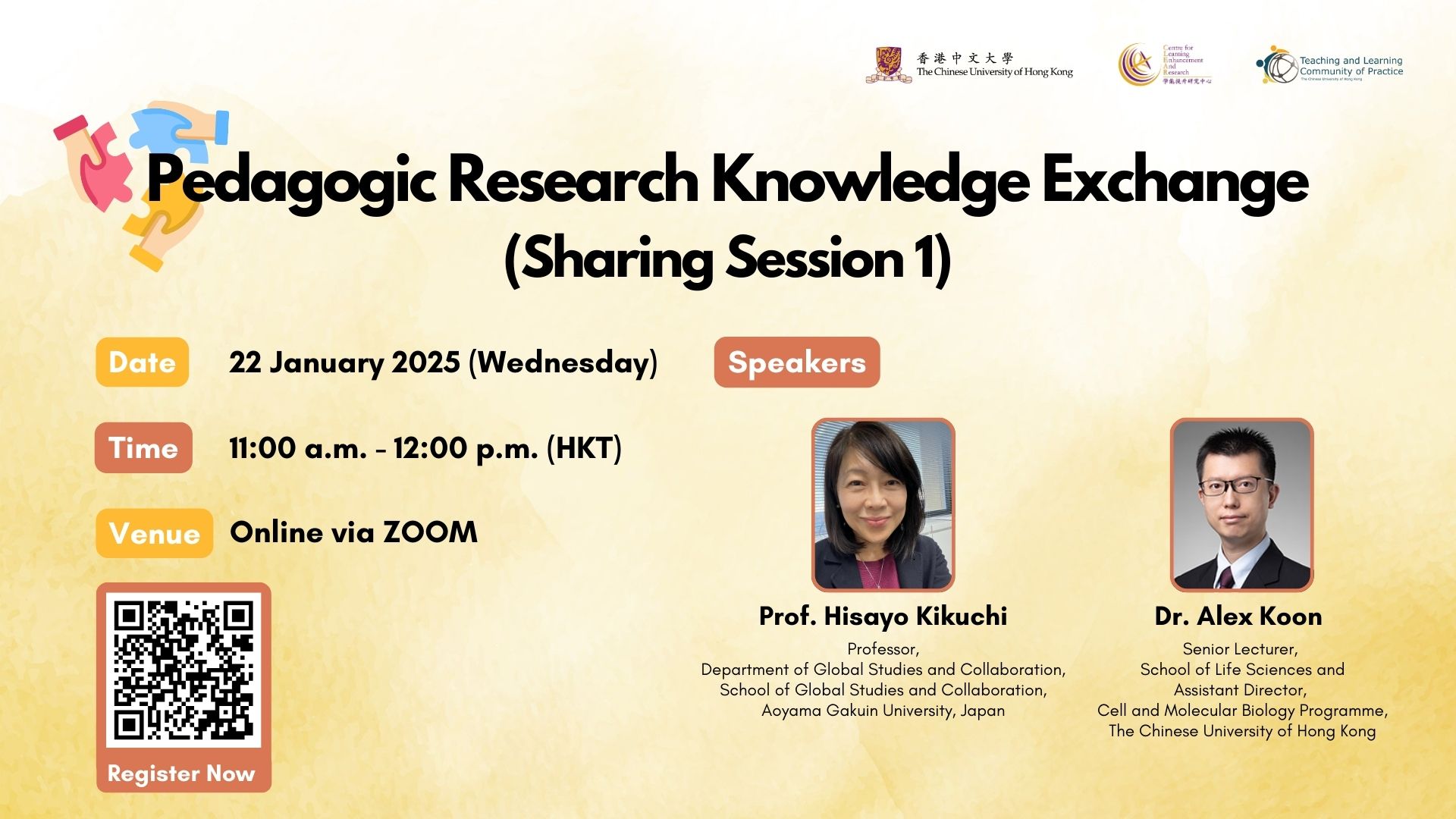Pedagogic Research Knowledge Exchange – Sharing Session 1
| You are cordially invited to join the “Pedagogic Research Knowledge Exchange – Sharing Session 1”, organized by the Teaching and Learning Community of Practice (T&L CoP). In this series, educators from CUHK and abroad will come together to share their teaching innovations and insights from pedagogic research. This interactive forum will facilitate discussions on theoretical, methodological, and empirical issues in educational research, while also providing opportunities to experiment with novel teaching practices. In this session, the speakers will explore how communication within educational settings can be enhanced through translanguaging—the use of various linguistic and multimodal resources—and humour as a pedagogical approach. Participants will gain both local and international perspectives on researching and developing their teaching practice. |
|
| Speakers & Topics: | 1. The Role of Translanguaging in Educational Contexts: Perspectives from UK Students Prof. Hisayo Kikuchi, Department of Global Studies and Collaboration, School of Global Studies and Collaboration, Aoyama Gakuin University, Japan Abstract: This study investigates the role of translanguaging in educational contexts, focusing on domestic and international students at UK universities between late 2023 and early 2024. In the context of demographic shifts post-Brexit, this research explores how translanguaging practices relate to students’ social identities and experiences. Using a mixed-methods approach, including surveys and interviews conducted across five UK universities, the study examines translanguaging’s presence and potential implications for educational practices and policies. 2. A Novel Planned Humour Pedagogical Approach to Improve Learning Across Disciplines Dr. Alex Koon, Senior Lecturer, School of Life Sciences and Assistant Director, Cell and Molecular Biology Programme, The Chinese University of Hong Kong Abstract: Humour is widely recognized as a common characteristic of many successful teachers. However, not every teacher is naturally humorous, and risks exist when inappropriate jokes are used in the classroom. To overcome these challenges, we developed a pedagogical framework termed “Planned Humour Incorporation System for Teaching and Learning Enhancement” (PHISTLE) to standardise the types of humour, ways of humour incorporation and frequency of humourous contents insertion in lecture PowerPoints to ensure positive outcomes that are both predictable and replicable. We evaluated the effect of this planned humour approach on students’ learning in five major universities in Hong Kong across three disciplines (life sciences, language and corporate communication) using retrospective pre-post questionnaires and semi-structured interviews. We demonstrated a positive correlation between the systematic use of humour (manifested in teaching style) and the students’ learning outcomes, including changes in competence, personal attributes and future behaviours. Our results indicated the strategic use of PHISTLE in higher education can likely improve students’ learning in a consistent and cross-disciplinary manner. Our upcoming plans include the use of AI to deliver humour-incorporated and non-humourized lectures in a more controlled setting for comparison, as well as to use AI to generate copyright-free humourous content for teaching. |
| Date: | 22 January 2025 (Wednesday) |
| Time: | 11:00 a.m. to 12:00 noon (HKT) |
| Format: | Online via Zoom |
| Target Audience: | CUHK Academic staff |
| Registration Link: | https://cuhk.qualtrics.com/jfe/form/SV_eVYeI0vhPBNqgui For enquiries, please contact Ms Vienne Lin (viennelin@cuhk.edu.hk) or Ms Vanessa Kiu (vanessakiu@cuhk.edu.hk). |
